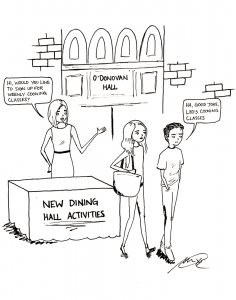 O’Donovan Hall serves around 3,000 students per week — slightly less than half of the student body — and receives a near-constant barrage of student criticism. Recognizing the poor reputation of Leo’s among students, Aramark has made efforts to incorporate greater student feedback to improve its services. These efforts will go to waste, however, if dining hall administrators are not proactive in improving the dining hall experience and solving some of the dining hall’s chronic problems.
O’Donovan Hall serves around 3,000 students per week — slightly less than half of the student body — and receives a near-constant barrage of student criticism. Recognizing the poor reputation of Leo’s among students, Aramark has made efforts to incorporate greater student feedback to improve its services. These efforts will go to waste, however, if dining hall administrators are not proactive in improving the dining hall experience and solving some of the dining hall’s chronic problems.
Student complaints about the quality of the food and services, interpreted by administrators as meaning the lack of lean protein options, resulted in the daily grilled chicken station on the lower level. With requests for more fresh fruit options, fresh grapes are now available almost daily, with fresh pineapple and strawberries also appearing more frequently. But these efforts have been underwhelmed by a Department of Health Food Establishment Inspection Report which rated Leo’s, in its “Risky” category and cited instances of insect, rodent and animal food contamination. The root cause of initial student complaints was never truly solved; the introduction of more fresh fruit and lean protein options does not improve the quality of the food if facilities remain unclean.
More recently, Leo’s and Georgetown University’s Health Education Services have put an emphasis on free nutrition consultations with Director of Health Education Serives Carol Day and full-time dietician, Ivy Mumo. However, despite increased marketing and advertising, especially of Mumo’s services, the plurality of students remains disengaged and has not taken full advantage of these opportunities. Leo’s administrators should make Mumo’s work visible to students by making her directly available to them at meal times. On the educational side, restructuring the Georgetown Campus Dining website’s “Eat Well” section to allow students to plan out meals and get quick, easy advice is also an option.
Students with common dietary restrictions also should not have to arrange a special appointment to figure out what they can eat at the cafeteria to maintain a balanced diet. From a consumer responsibility standpoint, Leo’s could do far more to make it easy for those students to eat well.
Rather than providing retroactive advice on how to navigate Leo’s options and focusing attention on a little-used consultation service, dining hall administrators must be proactive toward student needs if they are to change Leo’s current reputation.




















-_- • Oct 25, 2015 at 5:07 pm
Thesis: If the people in charge of the dining hall don’t fix the dining hall, it will still be bad.